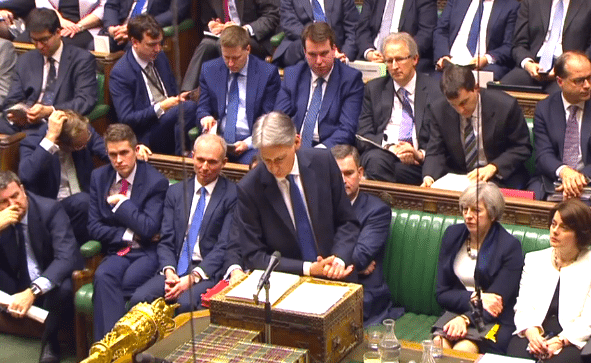
Chancellor of the Exchequer Philip Hammond delivered the final Spring budget today. Many policy questions persist as the UK separates itself from the European Union: Will the UK be able to maintain its leading economic status in Europe? Will the UK hold onto its dominance in financial innovation while boosting growth in both new and established industries? The Budget speech, as one may expect, included something for everyone.
Perhaps the most interesting aspect of the Spring Budget was the initial investment of £270 million in 2017 to 2018by the Industrial Strategy challenge fund. This investment is designed to kick-start the development of disruptive technologies that may have the potential to transform the UK economy. Innovation counts. Execution will determine success.
But what about participants in the alternative finance / Fintech sector? Crowdfund Insider has received several comments on the Spring Budget which we share below.
 Stuart Law, CEO and co-founder of P2P platform Assetz Capital, harshly criticized Hammond’s attempt at an inspiring budget;
Stuart Law, CEO and co-founder of P2P platform Assetz Capital, harshly criticized Hammond’s attempt at an inspiring budget;
“Today Philip Hammond has delivered one of the least interesting Budgets in recent memory. Other than protection for SMEs from the potential large rates increase, very little was announced of relevance to SMEs, or indeed their lenders. Hammond has missed a chance to take a fatal flaw out of the Innovative Finance ISA that prevents investors investing across multiple P2P platforms in the same tax year – leaving investment diversification very difficult for people. As the first post-referendum Budget the focus ought to have been on what the Government’s economic plan is for our departure from the European Union. However, as expected, Hammond took few chances and left us with as many questions as answers.”
Law said that eight months following the Brexit decision, businesses and investors remain in the dark as to the long term implications;
“Like other sectors, the P2P market needs a clear strategy outlined by the Government so that we can plan accordingly,” said Law.
 IW Capital CEO and Crowdfinders co-founder Luke Davis’ was more diplomatic in his review. Davis said the UK government has already made it clear that supporting SMEs was vital to the government’s plan;
IW Capital CEO and Crowdfinders co-founder Luke Davis’ was more diplomatic in his review. Davis said the UK government has already made it clear that supporting SMEs was vital to the government’s plan;
“Today’s Spring Budget, while conservative and without any notable announcements, built on a raft of measures that have been implemented since November last year with further investments in digital infrastructure and technical skills that will help small businesses. However, as the country prepares for Brexit, it will be crucial that the most-promising SMEs have access to growth finance – from today’s Budget it is clear that we will have to wait for the recommendations of the treasury’s Patient Capital Review that began in January this year before the Chancellor’s hopefully addresses this issue in his first Autumn Budget,” shared Davis.
Noting that investor sentiment has continued to be quite resilient, Davis said more needs to be done;
“Recent research has demonstrated that investors are keen to invest in Britain’s SMEs, with one report revealing a 10% rise in the number of financial advisers recommending Enterprise Investment Scheme (EIS) and Seed Enterprise Investment Scheme (SEIS) investments into small to medium sized businesses. Moreover, IW Capital research found that 6.62 million UK investors believe that entrepreneurs will continue to play a critical role in driving private sector growth. If the country is to make a success of Brexit, more will need to be done to act on this positive sentiment and facilitate further investment into the vital category of scale-up businesses at the heart of the UK’s private sector.”
Davis said that one of the nation’s greatest success stories has been Britain’s global leadership with regard to alternative finance.
“In 2016, the volume of originations in the sector rose by almost 40% to a record total of £3.9 billion. The continued rise of this sector will be pivotal to supporting the scale-up agenda at the heart of the Modern Industrial Strategy with high street banks remaining too hesitant to support SMEs. The UK’s growth finance landscape did not play a major role in the Spring Budget but is likely to be subject to a great deal of attention from Whitehall in future.”
 Paul Marston, Head of Commercial Finance at RateSetter, said Hammond’s focus on productivity was the correct path:
Paul Marston, Head of Commercial Finance at RateSetter, said Hammond’s focus on productivity was the correct path:
“The Chancellor’s proclamation that the Government places raising productivity “at the very heart of its economic plan” may not be front page news, but is nevertheless of utmost importance. The Chancellor noted that “higher productivity means higher pay”, yet productivity in the UK lags 35% behind Germany and 18% behind the G7 average – and that the gap has not been closing in recent years,” said Marston. “Hammond did shed a little light on how the £23bn National Productivity Investment Fund is going to be deployed – infrastructure, science and innovation, research and technology such as 5G and better broadband.”
Marston pointed to the fact that government is only part of the solution;
“But raising productivity requires much more than government announcements – it relies on businesses becoming more efficient and growing,” added Marston. “Our research* shows that just under half of SMEs are looking to make their own businesses more efficient over the next six months, and we are seeing interest from a growing number of businesses in how we can help them realise their plans.”
 Edward Hardy, Economist at World First – a money transfer service, called the Spring Budget “predictable” but also cautioned there are stormy waters ahead;
Edward Hardy, Economist at World First – a money transfer service, called the Spring Budget “predictable” but also cautioned there are stormy waters ahead;
“Today’s budget certainly towed the line; Hammond’s reforms were predictable – just as he intended. However, the announcements were less gimmicky than previous budgets and tied to the Prime Minister’s agenda of social inclusion, pragmatism and future proofing of the economy. This year’s growth forecast has been upgraded but, crucially, longer-term growth expectations have either remained unchanged or been revised lower, suggesting the OBR believe recent economic strength is a front-loaded outlier, not a new normal. Other tax tweaks are to be net neutral in fiscal terms, despite Hammond quietly conceding that public spending will still be running £100bn higher as a direct result of the EU referendum result last year.”
Hardy raised the concern that increasing taxes on the Digital economy could temper economic growth;
“In today’s Spring Budget, the Chancellor was quick to provide relief for SME brick and mortar businesses from rising business rates but, in upcoming tax reforms, announced he is to begin targeting the online economy for the first time. The details of these policy changes will be released in due course, but a stiff increase in the tax burden on those selling online could be a major hindrance to the UK’s booming ecommerce community. This is likely to be felt in the north of England in particular, which accounts for over 30% of the UK’s online exports. On the other hand, the budget clearly sees any digital taxation as justified given the investment this government will be making in technical skills, the domestic workforce and a revitalised and regenerated training system for all young adults. It therefore suggests that a tax loss now will result in a productivity gain in the future.”
 Stuart Lucas, CEO of Asset Match – a platform that provides a secondary market for shares in UK private companies, also believed the Chancellor’s Budget fell short on objectives;
Stuart Lucas, CEO of Asset Match – a platform that provides a secondary market for shares in UK private companies, also believed the Chancellor’s Budget fell short on objectives;
“In the 2016 Autumn Statement, Chancellor Hammond committed significant investment to digital infrastructure across the country, boosting business confidence by providing support to the nation’s already vibrant private sector. Nearly three months on from this announcement, the 2017 Spring Budget continued to build on existing spending commitments through a £200 million for local projects to leverage private sector investment in full-fibre broadband, and ongoing devolution measures. While a modest step forward, it certainly was not the stride some business leaders were hoping for. Addressing small business concerns over business rates, the Chancellor eased some of the pressure to help small businesses facing the biggest increases through a new discretionary relief fund. But there was little on offer to improve support for scaling and leap companies who have so far not featured prominently in Philip Hammond’s fiscal speeches but that are like likely to appear in the Autumn Budget following the publication of the Patient Capital Review’s recommendations.”
Lucas echoed concerns about the UK government’s lack of direction in improving support for firms in need of growth capital to scale;
“As we look to the coming months and years, the Chancellor must ensure Britain’s business ecosystem remains a vibrant entity for scaling firms. Investors are clearly confident in the long-term growth prospects of British businesses, and with record low-interest rates, it’s important that investors are able to act on these interests without unnecessary financial hindrance – this includes the abolishment of stamp duty on private share transactions. Failing this, the Government risks overlooking the long-term capital needs of Britain’s scaling businesses and the significant growth potential they hold.”

